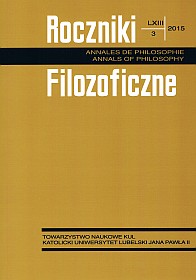Alexander Pruss on Love and the Meaningfulness of Sex
Abstract
In this essay I explore Alexander Pruss’ conceptions of love and sexual desire. I argue that he fails to provide a convincing account of either and that one reason for this is that he ignores far too much relevant material in philosophy and the arts that needs to be taken into account in a thorough investigation of such matters. I argue further that Pruss’ understanding of love and sex is highly moralized, meaning that his discussion is not at all sensitive to the actual human experience of these, but consistently falsifies them. I also argue that the teleology to which Pruss appeals in order to ground his claim that, in the sexual act, the bodies of the lovers are striving for reproduction, is implausible and, further, that, even were it not, we could not infer from such teleology the moral conclusions that Pruss wishes to extract from it.
References
Améry, Jean. Jenseits von Schuld und Sühne. Bewältigungsversuche eines Überwältigten. Stuttgart: Klett-Cotta, 2008.
Bloom, Allan. Love and Friendship. New York: Simon and Schuster, 1993.
Frankfurt, Harry G. The Reasons of Love. Princeton: Princeton University Press, 2004.
Jones, John. On Aristotle and Greek Tragedy. London: Chatto & Windus, 1964.
Kant, Immanuel. Eine Vorlesung über Ethik, edited by Gerd Gerhardt. Frankfurt am Main: Fischer, 1991.
Nietzsche, Friedrich. Götzen-Dämmerung, Volume VI of Sämtliche Werke: Kritische Studienausgabe in 15 Einzelbänden, edited by Giorgio Colli and Mazzino Montinari. Berlin: Walter de Gruyter, 1980.
Pruss, Alexander. One Body: an Essay in Christian Sexual Ethics. Notre Dame, Ind.: University of Notre Dame Press, 2013.
Copyright (c) 2015 Roczniki Filozoficzne

This work is licensed under a Creative Commons Attribution-NonCommercial-NoDerivatives 4.0 International License.





